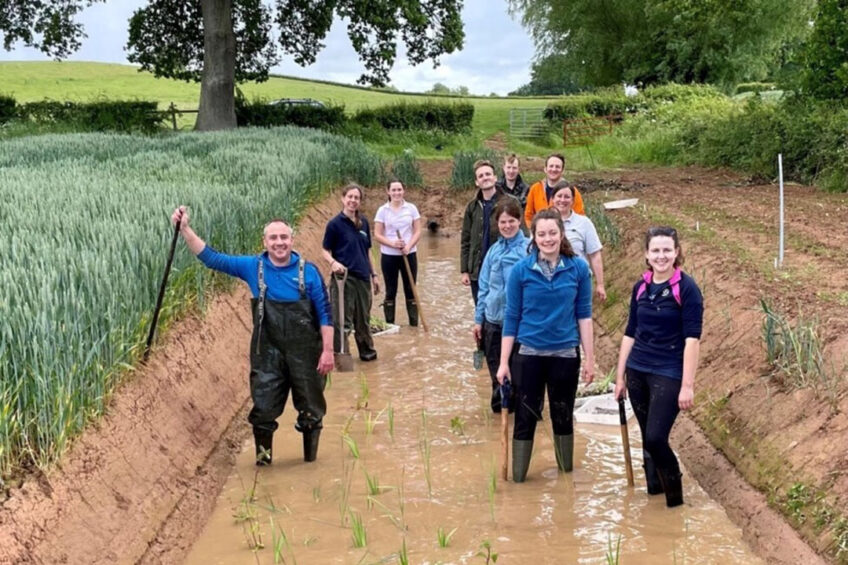Egg firm trials wetlands project to enhance natural environment

Intensive poultry units have been criticised for the decline in water quality on the English/Welsh border due to the large amounts of phosphates leaching into rivers.
Figures recently released from the UK’s water watchdog, the Environment Agency, showed that livestock farms in England polluted more than 200 rivers in 2021. And while the majority of incidents involved dairy farms, pressure has been growing on the intensive poultry sector.
Wetlands project launched
Now, the UK’s largest egg company, Noble Foods, has launched a new wetlands project with The Wye and Usk Foundation (WUF) and Marks and Spencer, which is designed to radically improve how a Herefordshire farm interacts with the local environment.
The joint venture is taking place at the Orgee family’s Upper Moorend Farm, Bromyard, and is looking to slow the flow of water from the site, improve water quality and reduce flood risks. The nature-based solution is seen as a win-win for all stakeholders – farmers, environmental groups, local wildlife and residents.
Future-proofing
Joe Orgee said it was important for action to be taken: “For our business, we have to work with the environment, especially if we want to expand the farm. Something like this is likely to be a necessity in the future, so we’re future-proofing the business.”
The WUF are conserving, restoring, and improving the environments and habitats of the rivers Wye and Usk, including their catchments, tributaries, watercourses and estuaries, which the Foundation will protect and enhance indigenous animal and plant species.
Their objective is to present pollution entering surrounding waterways. With the region home to many poultry meat and egg producers, it’s hoped that over time, more nature-based solutions will be implemented by producers in the area.
Key benefits
The Orgee family produces eggs for the RSPCA-assured Happy Egg Co and hope the project will bring 3 key benefits:
- Improved water quality – Creating pools provides benefits by trapping traces of excessive nutrients and reducing nutrient load of the water before it reaches a nearby brook. Plant species planted have been chosen for having phosphorus-hungry properties, such as yellow flag iris. The system has been designed to provide the longest possible retention time in each pool to allow time for the plants to do their work.
- Natural flood management – To increase the capacity of Upper Moorend’s current attenuation pond, a series of 11 wetland pools is now linked together. The new vegetation in the pools will physically slow the flow of water through the system and provide extra capacity to store excess water in heavy downpours, releasing it slowly once peak flow has passed.
- Improved biodiversity and habitats – The 11 pools have been planted with 12 different species of vegetation and grasses. They will colonise with other plants, providing forage to birds and nectar for pollinators and insects and an aquatic habitat for amphibians and a water source for other wildlife.
It’s also anticipated that the vegetation will spread rapidly to cover the water surface, greatly reducing the attraction for other waterfowl and cutting the potential risk of the spread of avian influenza.
“We wouldn’t have put funding into this if we didn’t have the cooperation of the farmers.”
Glenn Evans, Noble Foods environmental manager, said the company would be involved in a survey, repeated in 3 or 5 years, to look at the potential biodiversity gain score.
“We wouldn’t have put funding into this if we didn’t have the cooperation of the farmers. Retailers also want to address the water quality issue. But we would like to see the government investing in things like this.”
The project has created a test site for everyone to learn from and gain benefits for the wider industry and farming community.
 Beheer
Beheer







 WP Admin
WP Admin  Bewerk bericht
Bewerk bericht